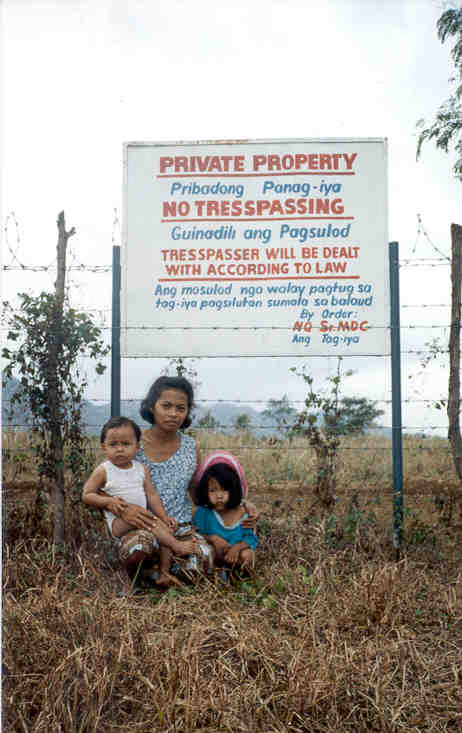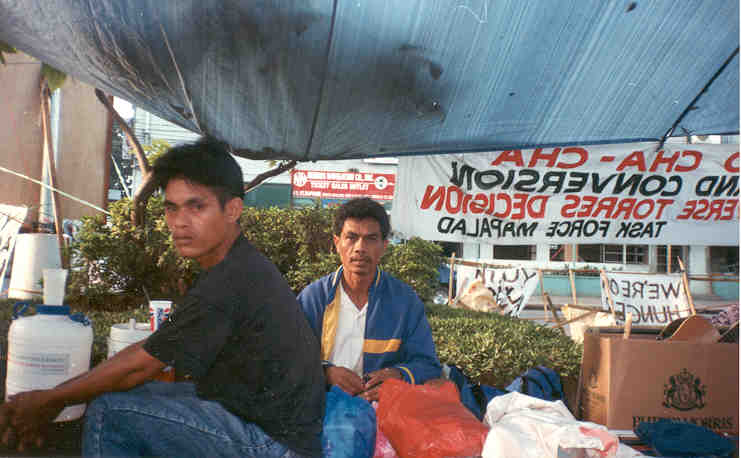Those Who Make Reform Impossible...
By Sean Farrell, Columban lay missionary
Chiquita Redosendo, a 27-year –old mother of two, comes from the small village of San Vicente, Bukidnon. I met her when she, alongside her companions, took the drastic step of going on a hunger strike to protest what has been happening to them. This was in October 1997 but their story begins long before this.
Dream Fulfilled
Chiquita is tribal and under the Government Agrarian Reform Programme she applied for land alongside her husband Ronaldo. She was told that she was qualified under this program. Along with a group of other tribal, landless farmers who formed a co-op called Mapalad, the government awarded them certificates of ‘land ownership’ for a property of 144 hectares belonging to the industrialist Norberto Quisumbing. Their co-op had 137 members, guaranteeing each family would receive about 1 hectare of prime agricultural land right in the very village that they come from. This was in 1995 and it seemed as if a dream had come true for them. They were finally to get the chance to raise their two children in their own simple house and on a small piece of land that they could call their own.
However over the weeks, months and years that have passed, their dream has turned into a nightmare. Despite having been declared the legal holders of the land Chiquita and her companions have been kept from farming their land by force delay, armed thugs and political corruption.
Surprise Move
Their story is one of oppression and injustice. Firstly, the landlord got the local politicians on his side. They together pressurized the Office of the President to take the agricultural land form the farmers and award it back to them for industrial use. Despite the existence of the local government law against his procedure, President Ramos’ Executive Secretary Ruben Torres reversed the land decision and gave the land that rightly belonged to the tribal farmers back to the land owner. Chiquita could not believe what was happening to her dream: “My heart was so pained – and I felt so put down and oppressed by the local government officials especially out local mayor and out local governor here in Bukidnon. Not only would they not help us at all, but hey continually aided those who wanted to keep us off our land.”
Driven Off
Out of frustration with the local and national political corruption that they were experiencing the farmers decided to enter their property and exert their rights to the land. Chiquita and Ronaldo entered the land with their Mapalad companions. Why shouldn’t they, they said. After all, it had been awarded to them. They set up their tents and began cleaning grasses. Their work only lasted 2 days. Then they realized the strength of those opposed to them. A private army led by Col. Noble and employed by Mr. Quisumbing arrived at the site. They fired weapons, burned tents and use a herd of carabao to drive the farmers from their land. The message had been very clear. The farmers sat outside the land and watched armed thugs patrolling the ground where their crops should be growing.
Hunger Strike
They however did not retaliate to the obvious intimidation and treats of violence and death. They made many appeals and petitions even to President Ramos himself. They got nowhere. Finally a decision was made to make a final gesture of how unjust the treatment of them had been. They went on a hunger strike. For 30 days, 18 strikers stayed in makeshift tens on the streets of Manila and Cagayan de Oro. I myself will never forget that moth or as long as I live. The courage and bravery of these people was incredible. They fought for life from the very jaws of death. Those of us who supported them at this time saw them lose weight, suffer headaches, get sick and feel terrible stomach pains. We saw a number of the strikers like Tessie collapse from the lack of food and the sheer exhaustion of their trials.
Active Nonviolence Succeeds
On day 14 of the strike, the President announced that he would make a decision in six days. It was clear that the national media attention had turned their case from just another problem in the mountains to a national issue. When the six days passed and no decision was made the farmers resumed the hunger strike, swearing they would not yield until they got what was rightfully theirs. Finally, a decision was made. President Ramos awarded 100 hectares to the Mapalad farmers and 44 hectares to Mr. Quisumbing. He called it ‘win win’ solution. Chiquita still has strong memories of that time: “The time of the hunger strike was really terrible. I felt such hunger and such terrible weakness. We waited and suffered for the decision of President Ramos and we struggled onwards, thanks to the many people who supported us because we stood so strong, we won back our land.”
Great Joy
When the strikers returned there was a great joy and celebration. Chiquita and her husband were reunited. She went back to her humble home to be reunited with her two children. Kin-kin, two and a half-year-old girl and her one-year-old son, Daryl. It was a truly joyful homecoming for she had never been away from them before. She felt weak, tired and worn out as did all her companions. But they felt that it was not for nothing. A great deal had been achieved. At least that’s how it seemed.
How long, Lord?
That was last November 1997. Still today, not one of them have put single mark on the land that President Ramos ordered would be given to them. Bureaucratic delay, legal cases and local political connections have prevented this. The farmers have had picket the offices of the Department of Agrarian Reform to get them to act on the President’s order. And now the local registry of deeds in Bukidnon refuses to admit their claims and register them as owners, citing the excuse that there is an on going Supreme Court case. Everywhere the farmers turn another legal obstacle is placed in front of them. they know that the Quisumbing have filed a case in the Supreme Court, but how long will it take? “Why?” the farmers ask. Are they not now installed on their and if they have a written order on the President himself? How can they tolerate the system that gives with one hand and allows armed thugs to keep them off their land with the other? Just when will justice be done? When will these people suffer enough?
Chiquita stands outside the land she dreams of, holding her two children close to her. “They have surrounded our land with pillars and barbed wire because Quisumbing does not want us to enter. We feel oppressed and downtrodden because we stand here outside the land which is ours, for our future and especially for the future of our children.”
As we go to press, the Supreme Court has finally ruled that the Sumilao farmers have lost their claim on the 144-hectare Quisumbing Estate. The farmers’ lawyers predict that “in the coming months, the effects of the decision would be felt by other farmers seeking to own lands”

